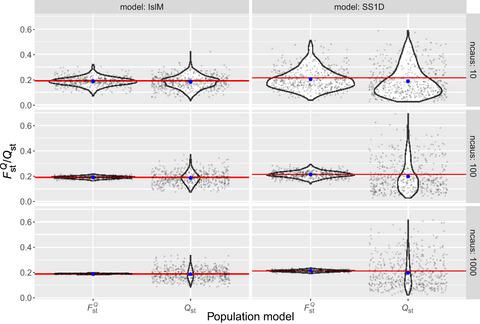Our official English website, www.x-mol.net, welcomes your
feedback! (Note: you will need to create a separate account there.)
Common garden experiments to study local adaptation need to account for population structure
Journal of Ecology ( IF 5.3 ) Pub Date : 2020-10-15 , DOI: 10.1111/1365-2745.13528 Pierre Villemereuil 1 , Oscar E. Gaggiotti 2 , Jérôme Goudet 3, 4
中文翻译:

研究当地适应的普通花园实验需要考虑人口结构
更新日期:2020-10-15
Journal of Ecology ( IF 5.3 ) Pub Date : 2020-10-15 , DOI: 10.1111/1365-2745.13528 Pierre Villemereuil 1 , Oscar E. Gaggiotti 2 , Jérôme Goudet 3, 4
Affiliation

|
- Common garden experiments are precious to study adaptive phenomenon and adaptive potential, in that they allow to study local adaptation without the confounding effect of phenotypic plasticity. The QST − FST comparison framework, comparing genetic differentiation at the phenotypic and molecular level, is the usual way to test and measure whether local adaptation influences phenotypic divergence between populations.
- Here, we highlight that the assumptions behind the expected equality QST = FST under neutrality correspond to a very simple model of population genetics. While the equality might, on average, be robust to violation of such assumptions, more complex population structure can generate strong evolutionary noise.
- Synthesis. We highlight recent methodological developments aimed at overcoming this issue and at providing a more general framework to detect local adaptation, using less restrictive assumptions. We invite empiricists to look into these methods and theorists to continue developing even more general methods.
中文翻译:

研究当地适应的普通花园实验需要考虑人口结构
- 常见的花园实验对于研究适应性现象和适应性潜力非常宝贵,因为它们可以研究局部适应性,而不会受到表型可塑性的混杂影响。Q ST - F ST比较框架,比较表型和分子水平的遗传分化,是测试和测量局部适应是否影响种群之间表型差异的常用方法。
- 在这里,我们强调在中性条件下预期相等性Q ST = F ST背后的假设对应于一个非常简单的群体遗传学模型。虽然平均而言,平等可能对违反此类假设具有鲁棒性,但更复杂的种群结构会产生强烈的进化噪音。
- 合成。我们强调了最近旨在克服这个问题的方法学发展,并使用限制较少的假设提供更通用的框架来检测局部适应。我们邀请经验主义者研究这些方法,并邀请理论家继续开发更一般的方法。











































 京公网安备 11010802027423号
京公网安备 11010802027423号